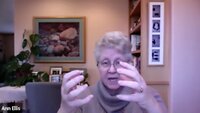| Title |
Ellis, Ann OH26_011 |
| Creator |
Weber State University, Stewart Library: Oral History Program |
| Contributors |
Ellis, Ann, Interviewee; Harris, Kandice, Interviewer and Video Technician |
| Collection Name |
Storytelling Festival Oral Histories |
| Description |
The WSU Storytelling Festival was implemented by the Friends of the Stewart Library in 1992. The library sponsored and managed the annual festival until 1998, when the festival was moved to the Department of Teacher Education, with the Library continuing as a sponsor. The three-day festival entails storytellers from all over the nation, including youth storytellers. The events are made up of workshops and presentations, a fund-raising banquet, and a wrap-up of wonderful stories from gifted performers. |
| Abstract |
The following is an oral history interview with Ann Ellis, conducted on March 19, 2021, by Kandice Harris, via Zoom. Ann discusses her life, her career as a storyteller, and her memories of the Weber State University Storytelling Festival.; The following is a video clip of an oral history interview with Ann Ellis, conducted on March 19, 2021, via Zoom Communications Platform, by Kandice Harris. In this video clip, Ann describes what the storyteller and the audience members experience during a storytelling performance. |
| Image Captions |
Ann Ellis 19 March 2021; Ann Ellis speaking about processes that happens when a storyteller tells a story to an audience. |
| Subject |
Ogden (Utah)--Maps; Storytelling; Storytelling festivals; Digital Storytelling; Storytelling--United States; COVID-19 Pandemic, 2020- |
| Keywords |
Virtual storytelling; Professional storytellers; Weber State University |
| Digital Publisher |
Stewart Library, Weber State University, Ogden, Utah, USA |
| Date |
2021 |
| Medium |
oral histories (literary genre) |
| Spatial Coverage |
Ogden, Weber, Utah, United States, https://sws.geonames.org/5779206, 41.223, -111.97383; Roosevelt, Duchesne, Utah, United States, https://sws.geonames.org/5780699, 40.2994, -109.98876; Hawaii, Hawaii, United States, https://sws.geonames.org/5855797, 20.78785, -156.38612 |
| Type |
Text; Image/StillImage; Image/MovingImage |
| Access Extent |
20 page PDF; Video clip is an mp4 file, 35.3 MB |
| Conversion Specifications |
Filmed and recorded using Zoom Communications platform. Transcribed using otranscribe.com. |
| Language |
eng |
| Rights |
Materials may be used for non-profit and educational purposes, please credit University Archives; Weber State University; Background music for the opening of the video clip was downloaded from https://uppbeat.io/t/sky-toes/the-long-ride-home; License Code SHMYB9XWFGM8KLVU; Background music for the closing of the video clip was downloaded from https://uppbeat.io/t/yeti-music/gentle-breeze; License Code IWGKRYG7XHQOMZY0 |
| Source |
Ellis, Ann OH26_011 Weber State University Archives |
| Format |
application/pdf; video/mp4 |
| ARK |
ark:/87278/s644e4vz |
| Setname |
wsu_sf |
| ID |
111929 |
| Reference URL |
https://digital.weber.edu/ark:/87278/s644e4vz |
| Title |
Ellis, Ann OH26_011 |
| Creator |
Weber State University, Stewart Library: Oral History Program |
| Contributors |
Ellis, Ann, Interviewee; Harris, Kandice, Interviewer and Video Technician |
| Description |
The WSU Storytelling Festival was implemented by the Friends of the Stewart Library in 1992. The library sponsored and managed the annual festival until 1998, when the festival was moved to the Department of Teacher Education, with the Library continuing as a sponsor. The three-day festival entails storytellers from all over the nation, including youth storytellers. The events are made up of workshops and presentations, a fund-raising banquet, and a wrap-up of wonderful stories from gifted performers. |
| Abstract |
The following is an oral history interview with Ann Ellis, conducted on March 19, 2021, by Kandice Harris, via Zoom. Ann discusses her life, her career as a storyteller, and her memories of the Weber State University Storytelling Festival. |
| Image Captions |
Ann Ellis 19 March 2021 |
| Subject |
Ogden (Utah)--Maps; Storytelling; Storytelling festivals; Digital Storytelling; Storytelling--United States; COVID-19 Pandemic, 2020- |
| Keywords |
Virtual storytelling; Professional storytellers; Weber State University |
| Digital Publisher |
Stewart Library, Weber State University, Ogden, Utah, USA |
| Medium |
oral histories (literary genre) |
| Spatial Coverage |
Ogden, Weber, Utah, United States, https://sws.geonames.org/5779206, 41.223, -111.97383; Roosevelt, Duchesne, Utah, United States, https://sws.geonames.org/5780699, 40.2994, -109.98876; Hawaii, Hawaii, United States, https://sws.geonames.org/5855797, 20.78785, -156.38612 |
| Type |
Text; Image/StillImage |
| Access Extent |
20 page PDF |
| Language |
eng |
| Rights |
Materials may be used for non-profit and educational purposes, please credit University Archives; Weber State University |
| Source |
Ellis, Ann OH26_011 Weber State University Archives |
| Format |
application/pdf |
| Setname |
wsu_sf |
| ID |
111980 |
| Reference URL |
https://digital.weber.edu/ark:/87278/s644e4vz/111980 |





